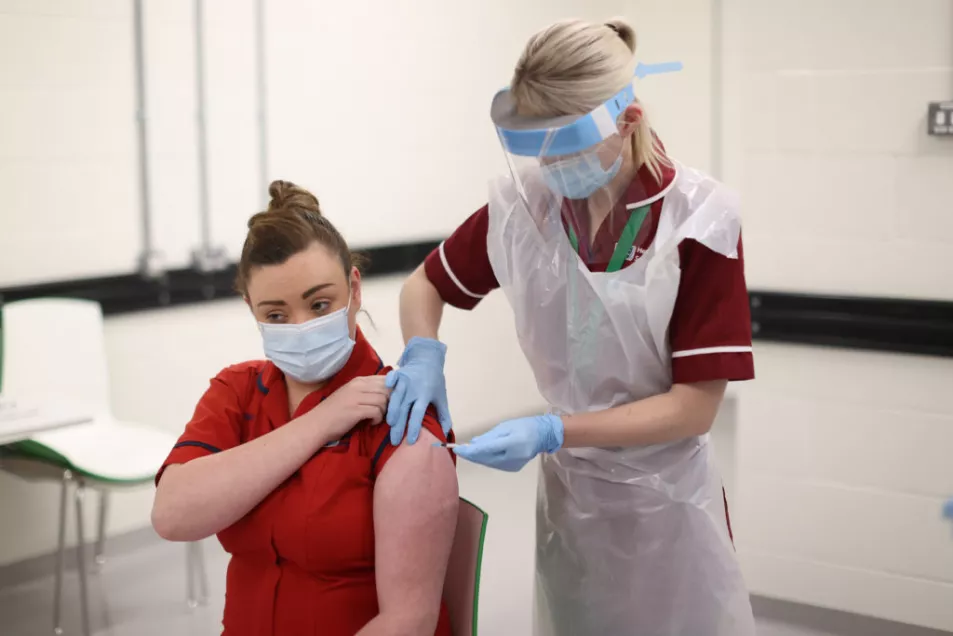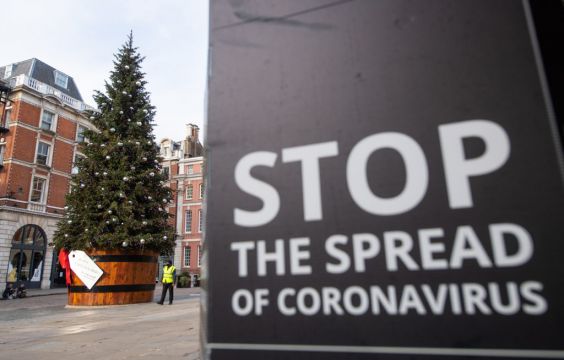A new variant of coronavirus has been detected in the UK, which England's chief medical officer Professor Chris Whitty says can spread more rapidly, prompting an early move to tightened restrictions ahead of Christmas and the New Year for Northern Ireland, Wales, Scotland and the south-east of England.
The Irish Government is now holding urgent talks to consider imposing travel restrictions for passengers coming from the UK in an effort to halt the transmission of the strain.
While Prof Whitty has stressed there was currently no evidence the new strain causes higher mortality rates or affected vaccines and treatments here are some of the key questions about the variant.
Is this something unusual?
There have been many mutations in the virus since it emerged in 2019.
This is to be expected – SARS-CoV-2 is an RNA virus and these viruses mutate and change.
Public Health England (PHE) said that, as of December 13th, 1,108 cases with this new variant had been identified, predominantly in the south and east of England.
It has been named VUI-202012/01, the first variant under investigation in December.
What has the UK determined about the variant?
Prof Whitty said that the UK has informed the World Health Organisation (WHO) that the new variant coronavirus can spread more rapidly.
In a statement yesterday, he said following the rapid spread of the new variant, preliminary modelling data and rapidly rising incidence rates in the south-east of England, the UK's New and Emerging Respiratory Virus Threats Advisory Group (NERVTAG) now consider that the new strain can spread more quickly.
Is this something to be worried about?
If the virus spreads faster, it will be harder to control.
However, there have already been various strains of Covid-19 with no real consequence.
The Covid-19 Genomics UK (COG-UK) consortium said it is difficult to predict whether any given mutation is important when it first emerges, and that it would take “considerable time and effort to test the effect of many thousands of combinations of mutations”.
It said the biggest concern is any changes that lead to an increase in reinfections or vaccine failure, and that most attention is on mutations in the gene that encodes the spike protein.
There are currently about 4,000 mutations in the spike protein gene.
Prof Whitty has said that there is no current evidence to suggest the new strain causes a higher mortality rate or that it affects vaccines and treatments.
But he said that “urgent work” was under way to confirm this and warned that it was “more vital than ever” that people continued to take action to reduce the spread of the virus.
Public health experts in Ireland have also been paying close attention to the developments in the UK, with the director of the National Virus Reference Laboratory, Dr Cillian De Gascun tweeting earlier this week that the UK's variant had not been detected here yet.
Based on the available sequence data @nvrlucdireland the novel #SARSCoV2 🦠#UK #variant has not been detected in #Ireland🇮🇪 (ROI) to date. With thanks to colleagues @firefoxx66 @nextstrain @GISAID Highlights importance of #surveillance #HoldFirm #EveryContactCounts #COVID19
— Cillian De Gascun (@CillianDeGascun) December 15, 2020
Is it the first novel strain detected?
A number of variants have previously been detected using sequencing studies in the UK.
Elsewhere, a specific variant (the D614G variant) has previously been detected in western Europe and North America, which is believed to spread more easily but not cause greater illness.
Are new variants always a bad thing?
Not necessarily - they could even be less virulent.
However, if they spread more easily but cause the same disease severity, more people will end up becoming ill in a shorter period of time.
Should we expect the virus to become more harmful?
Not really. Only changes that make viruses better for transmission are likely to be stable and result in new circulating strains.
The pressure on the virus to evolve is increased by the fact that so many millions of people have now been infected.
Most of the mutations will not be significant or give cause for concern, but some may give the virus an evolutionary advantage which may lead to higher transmission or mean it is more harmful.
Will vaccines still work?

The vaccine produces antibodies against many regions in the spike protein, and it is unlikely a single change would make the vaccine less effective.
However, this could happen over time as more mutations occur, as is the case every year with flu.
Public Health experts in England have said this new variant includes a mutation in the spike protein and that changes in this part of the spike protein may result in the virus becoming more infectious and spreading more easily between people.
What are the scientists doing now?
Scientists will be growing the new strain in the lab to see how it responds.
This includes looking at whether it produces the same antibody response, how it reacts to the vaccine, and modelling the new strain.
It could take up to two weeks for this process to be complete.
If it’s not that big a deal, why do we care?
While other variants have been identified in the past, it appears this particular strain is spreading quite fast, meaning it could be more transmissible, and therefore warrants further investigation.
Professor Sir Mark Walport, a member of the UK government’s Scientific Advisory Group for Emergencies (Sage), said there was a possibility that it could have a “transmission advantage”.
What examples are there of other virus strains?
The Danish government culled millions of mink after it emerged that hundreds of Covid-19 cases in the country were associated with SARS-CoV-2 variants associated with farmed mink – including 12 cases with a unique variant, reported on November 5th.
In October a study suggested that a coronavirus variant that originated in Spanish farmworkers spread rapidly throughout Europe and accounted for most UK cases.
The variant, called 20A.EU1, is known to have spread from farmworkers to local populations in Spain in June and July, with people then returning from holiday in Spain most likely playing a key role in spreading the strain across Europe.







